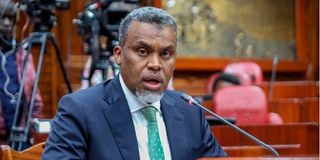
National Intelligence Service (NIS) Director-General Noordin Haji.
Ever since I was shortlisted and interviewed for a Principal Secretary position many moons ago, I have had to rejig my reading habits to attune myself with the laws and practice governing the country’s bureaucracy.
In my route to having a meeting of minds with the interview panel and the lingering quest to not embarrass those who paid my school fees with bags of beans, I was exposed to a critical mass of legal statutes existing to breathe life into organs of the state and their cardinal appendages that exists to run government like clockwork.
When the frog jumps out of the water at high noon to alert you that the river has all the laws it needs to flow smoothly, you better believe it.
Numerous arguments have been advanced in support of inculcating a focused reading culture that those who went to school to merely pass exams cannot relate with.
Experts who went to school to study the brain and how it communicates with other body organs have been categorical that those who read religiously and intentionally have several competitive advantages over those who quarrel with books whenever they’re stuck during coursework.
A targeted reading culture confers to the reader an increase in knowledge of subject matter, inculcates stronger analytical and thinking skills, stimulates imagination and creativity, reduces stress, and most importantly improves on their sleep.
I’m about to conclude my reading of Gerald Hanley’s pinpoint ethnographic account of the Somali community, ‘Warriors: Life and death among the Somalis’.
For only Sh4,000, you’ll get to debunk the myths and misconceptions that has been peddled by footloose analysts misrepresenting facts and sowing seeds of ethnic prejudice against communities they only interact with whenever they’re scavenging for Ramadhan freebies. Ignorance is a bad thing – verbalising ignorance is worse than watching paint dry.
I first came across the National Intelligence Services Act during my preparations for PS interviews in January.
Previously, I had been like any other Kenyan ignoramus with an iceberg view of the security agency which operates in darkness and leaves no traces in their wake.
Someone had hinted to me that as a government officer I would be required to observe some elite level of discretion while handling state secrets passing through my hands and some of the general knowledge questions the interview would subject me to would potentially revolve around how I would go about the same.
Unknown to me then, Section 5b of the NIS Act mandates the Service to assist with carrying out security vetting investigations for the security clearance of persons who hold, or may hold, vettable government positions or who have or may have access to any sensitive or classified information.
Had the question emerged during my vetting, I was informed, I was to not only talk about the statute in diagrams, but also quote the number and name – it showed depth of understanding, confidence in my craft and readiness to settle in, I was told.
When the NIS Director General Mohammed Noordin Haji emerged from the woods last week to face a barrage of questions from Kenyans who’ve been baying for darts with his head since June last year, he walked into uncharted territory his predecessors would’ve allowed over their dead bodies.
Kenyans for the first time were watching live a security outfit that thrives in darkness coming to light and entertaining questions about the nature of their mysterious dealings and covert intrigue.
It was a delicate balancing act between opening the Service’s door to the public and keeping state secrets under lock and key. The public lecture was as unprecedented as it was eye-opening, both to the academics in the room and to the general public who have harboured imaginations about the kind of acrobatics conducted by the Service at ungodly hours.
For being bold enough to face the blades, Mr Haji gets an A for Effort in his end-term academic report.
Yet such public appearances are what Kenyans have been asking for since this regime received a rude shock in June last year. The 2024 Gen Z revolt – coupled with the heavy burden of historical injustices carried forward since 1963 – jolted the government to rub their eyes and see clearly the kind of harm its policies have been inflicting on the suffering class, calling for more transparency in government spending and accountability among public officers.
By opening up the NIS to public scrutiny, Mr Haji may have unknowingly unsheathed a double-edged sword: the public may use the moment to drown him in blood, or help him sharpen it with insights on how best the sword can be used to protect us all from those who look at our country with evil eyes.
Those who went to primary school in my days when there were seven examinable subjects and admission to national schools was more difficult than the camel going through the eye of a needle, there used to be this questions in the GHCRE paper that went like this: “If you’re the citizen of a country reeling from the aftermath of the breakdown in public trust and you’re invited to a public lecture by the National Intelligence Service, as a Christian what would you do?”
Write to the organizers expressing your disapproval of the forum. Attend the forum and offer insights into how you’d want them to treat fellow Kenyans. Attend the forum and chant ‘Ruto Must Go’. Attend the forum and ask for your allowance.
The answer to the above question will depend on which side of the Christianity spectrum the candidate was born into and is a card-carrying participant of.
Candidates in the Mt Kenya region would overwhelmingly go for option D, judging by this week’s events; while university professors and students of public administration would vote for option B. As for me and my family, we will serve the Lord.













